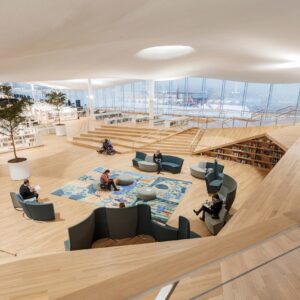Most of all, I like the city for its visual complexity, and for its recurring architectural surprises. It is the best Art Nouveau city in the world, with only Brussels as a rival, and also a top tier modernist city. Public buildings are excellent, and unlike in Stockholm you are never quite sure what is coming next.
The Finns are amazing at building out lovely, cozy rooms. In a used bookstore you might find a room for sitting on a comfortable chair and reading. It will look and feel perfect. I even saw one men's room with this flavor, and yes it had a comfy chair.
It is striking, and instructive, that the Japanese have such a strong presence in tourism in Finland. Their groups dominate visits to the underground rock church, for instance. Japan and Finland both have something inscrutable in common? And they both share an obsession with design and with small detail.
One nice thing about Helsinki is you can find a good restaurant in almost any part of town. Unlike say Paris, New York, or London, they do not have "dining deserts" where tasty places are absent for reasons of rent or zoning. Similarly, Helsinki also has a very high quality of small shop, in areas such as jewelry, used clothing, and design. Again, as with the restaurants, you can find these in almost any part of town. Helsinki has avoided the trap of looking and feeling like the other global cities, as the price-rent gradients simply are not that oppressive.
Along related lines, you will see non-white immigrants in great numbers in the center of town. In Stockholm, in contrast, non-white immigrants are priced out of the center to a considerable degree, though of course you can see them working in service jobs there,
The spaces in the new public library are remarkably inviting for sitting and reading. The interior is also an example of an institution that has leapt into being retro, without ever having managed to be fashionable in the interim (the opposite of mobile money in Kenya leapfrogging more antiquated money and banking institutions). In an act of supreme wisdom, they have stacked the library with "technology," most of all 3-D printers and advanced sewing machines. It now looks quaint and charming, much like the older buildings around town. It is the smart phones that hold the attention of the library visitors, even in this relatively reading-sympathetic culture.

In Nordic countries, Thai food usually is better than Chinese. Georgian food is something you also might try in Helsinki. Salmon soup is good, but you don't need to have it more than once. The whitefish and small river fish I enjoyed.
The Finns are interesting to speak to, especially about Finland. One woman said (paraphrased): "We can talk to each other for hours, and still not understand, so how do you expect the immigrants to understand us?" Multiple meanings can be assigned to that remark.
Another said something like: "No, the Finns are not the happiest people in the world. Once foreigners stop asking us how happy we are, we go back to complaining at each other about everything." Was she complaining about that?
Everywhere you go, you see Finns doing things with each other.
In my view, Helsinki is one of Europe's great cities, information-rich and out of the ordinary. It should be noted, however, that hardly anyone else agrees with this assessment, least of all the residents here.

